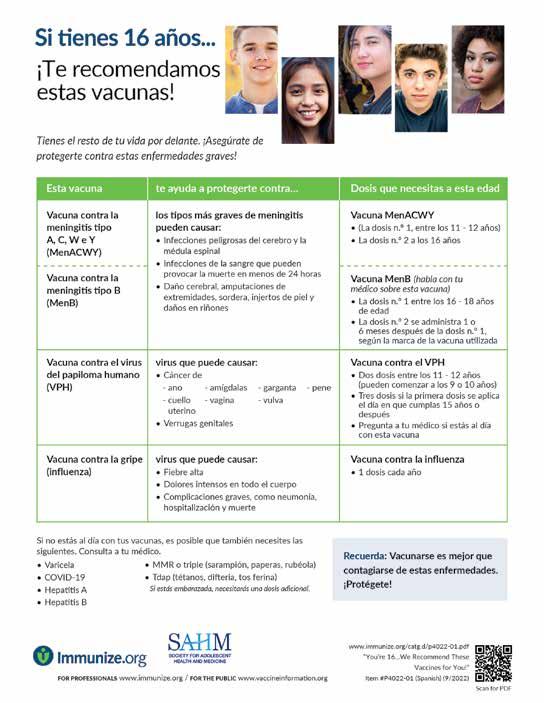
4 minute read
Los inmigrantes indocumentados también pagan impuestos y contribuyen a la base impositiva de los EU
POR STEVEN HUBBARD
Amedida que se acerca el día para declarar sus impuestos, es importante reconocer las contribuciones fiscales hechas por los inmigrantes, incluso aquellos que son indocumentados. Estas contribuciones desempeñan un papel vital en la financiación y sostenibilidad de los servicios y programas públicos de Estados Unidos.
Advertisement
Contribuciones fiscales de los inmigrantes
Los inmigrantes indocumentados hacen contribuciones significativas al sistema tributario de los Estados Unidos al pagar impuestos sobre las ventas, la renta y la propiedad.
Solo en 2021, estos hogares contribuyeron con $ 30.8 mil millones en impuestos totales, incluidos $ 18.6 mil millones en impuestos federales sobre la renta y $ 12.2 mil millones en impuestos estatales y locales, según datos de la Encuesta de la Comunidad Estadounidense.
Números de identificación fiscal individuales
Al menos el 50% de los hogares de inmigrantes indocumentados presentan declaraciones de impuestos utilizando Números de Identificación Fiscal Individual (ITIN), según el Instituto de Impuestos y Política Económica. Los ITIN son números de procesamiento de impuestos emitidos por el Servicio de Impuestos Internos, lo que permite que más personas contribuyan al sistema tributario y construyan la base impositiva.
Mientras que los inmigrantes indocumentados presentan impuestos utilizando un ITIN, otras personas también pueden obtener uno, incluidos los residentes permanentes legales, los extranjeros que trabajan en los Estados Unidos y los cónyuges inmigrantes de ciudadanos estadounidenses, entre otros.
En 2015, 4.4 millones de contribuyentes de ITIN pagaron más de $ 5.5 mil millones en impuestos sobre la nómina y Medicare y $ 23.6 mil millones en impuestos totales, según el IRS.
Beneficios fiscales
Los titulares de ITIN no son elegibles para todos los beneficios fiscales y beneficios públicos que los ciudadanos estadounidenses y otros contribuyentes pueden recibir. Por ejemplo, no son elegibles para los beneficios del Seguro Social o el Crédito Tributario por Ingreso del Trabajo (EITC). Es fundamental recordar que los titulares de ITIN pagan impuestos a estos y otros programas, como Medicare y Medicaid, que los estadounidenses usan todos los días.
Si un titular de ITIN es elegible para el Seguro Social en el futuro (como al convertirse en residente permanente legal), las ganancias reportadas con un ITIN pueden contar para su elegibilidad. Sin embargo, si nunca es elegible, no podría cobrar sus contribuciones.
A muchos inmigrantes indocumentados se les deducen impuestos de sus cheques de pago, incluso si no presentan declaraciones de impuestos.
Es importante reconocer que los inmigrantes indocumentados están pagando su parte justa hacia el bien público y esperan que algún día, ellos también se beneficien de sus contribuciones, al igual que millones de otros estadounidenses que presentan sus impuestos y cumplen con su deber cívico.
Steven Hubbard, Ph.D. es un científico de datos en el Consejo Americano de Inmigración, donde lleva a cabo proyectos de investigación y visualización de datos relacionados con la inmigración. Más recientemente, fue becario Zolberg en The New School y International Rescue Committee, donde realizó investigaciones sobre refugiados sirios que viven en Jordania. Con un profundo interés en la fotografía, reconoce la importancia de la visualización para comunicar problemas de datos complejos y facilitar la toma de decisiones basada en datos. Hubbard tiene más de 20 años de experiencia en la enseñanza universitaria, investigación y administración en la Universidad de Nueva York, la Universidad de Iowa y la Universidad Hamline. El Dr. Hubbard comenzó su carrera profesional como planificador de la ciudad para los gobiernos locales en el suroeste rural de Iowa.

BY STEVEN HUBBARD
As Tax Day approaches, it is important to acknowledge the tax contributions made by immigrants— even those who are undocumented. These contributions play a vital role in the funding and sustainability of America’s public services and programs.

Immigrants’ Tax Contributions
Undocumented immigrants make significant contributions to the U.S. tax system by paying sales, income, and property taxes.
In 2021 alone, these households contributed $30.8 billion in total taxes, including $18.6 billion in federal income taxes and $12.2 billion in state and local taxes, based on data from the American Community Survey.
Individual Tax Identification
Numbers
At least 50% of undocumented immi grant households file income tax returns using Individual Tax Identification Numbers (ITINs), according to the In stitute on Taxation and Economic Pol icy. ITINs are tax processing numbers issued by the Internal Revenue Service, allowing more people to contribute to the tax system and build the tax base.
While undocumented immigrants file taxes using an ITIN, other people may also obtain one, including legal permanent residents, foreign nationals working in the United States, and immigrant spouses of U.S. citizens, among others.
In 2015, 4.4 million ITIN filers paid over $5.5 billion in payroll and Medicare taxes and $23.6 billion in total taxes, according to the IRS.
Tax Benefits
ITIN holders are not eligible for all the tax benefits and public benefits that U.S. citizens and other taxpayers can receive. For example, they are not eligible for Social Security benefits or the Earned Income Tax Credit (EITC). It’s critical to remember that ITIN holders pay taxes to these and other programs, like Medicare and Medicaid, that Americans use every day.
If an ITIN holder becomes eligible for Social Security in the future (such as by becoming a lawful permanent resident), the earnings reported with an ITIN may count toward their eligibility. However, if they never become eligible, they cannot collect on their contributions.
Many undocumented immigrants have taxes deducted from their paychecks, even if they do not file income tax returns.
It is important to recognize that undocumented immigrants are paying their fair share toward the public good and hope that one day, they too will benefit from their contributions, just like millions of other Americans who file their taxes and fulfill their civic duty.
Steven Hubbard, Ph.D. is a data scientist at the American Immigration Council where he conducts research and data visualization projects related to immigration. Most recently, he was a Zolberg Fellow at The New School and International Rescue Committee where he conducted research on Syrian refugees living in Jordan. With a deep interest in photography, he recognizes the importance of visualization to communicate complex data problems and facilitate data driven decision making. Hubbard has over 20 years of experience in college teaching, research, and administration at New York University, The University of Iowa, and Hamline University. Dr. Hubbard started his professional career as a city planner for local governments in rural southwest Iowa.







